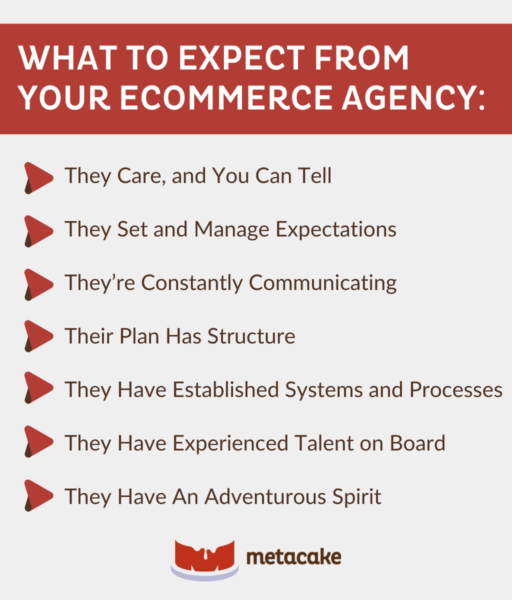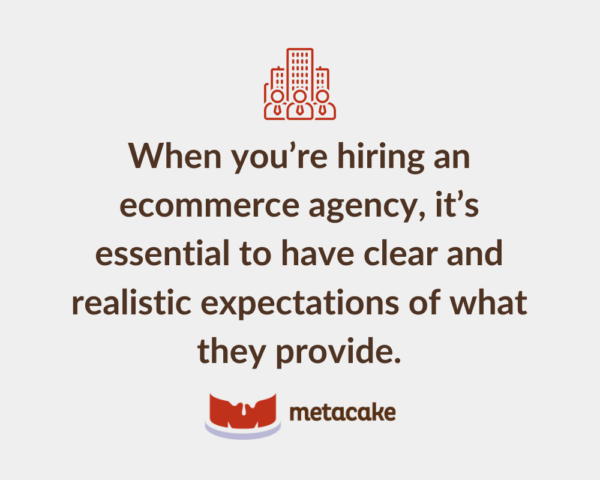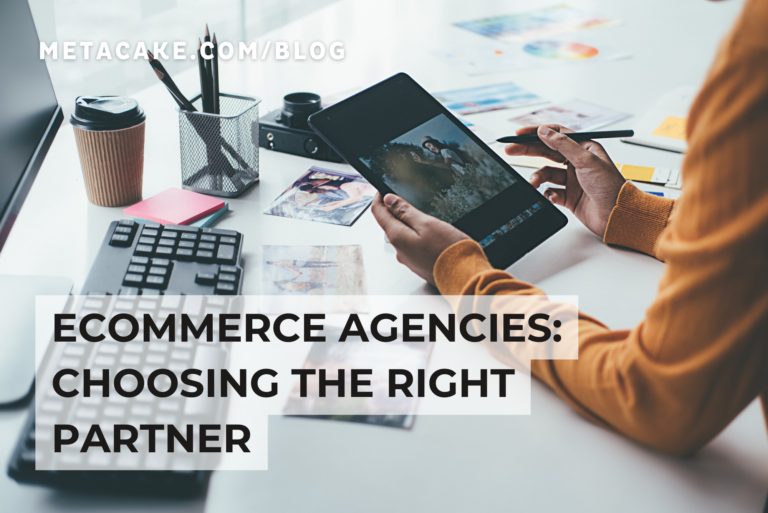You can’t throw a rock without hitting a business owner who’s had a negative experience with an ecommerce agency. These agencies could be in website development, design, or even marketing. Regardless of which area they’re in, this negative experience occurs mostly due to the agency failing to define or manage expectations during the process.
When something goes sideways, it’s usually because of a disconnect between:
- What the client was expecting
- What they’re paying for
- What they’re getting in the end
The thing is, people get burned by agencies, even if they’re incredibly good at what they do. Why? Because it’s a matter of communication, not just talent (although talent can certainly be an issue as well).
In this article, we’ll go over the types of ecommerce agencies, what you should expect from them, and some warning signs to steer you in the right direction.
Types of Ecommerce Agencies
Ecommerce agencies are specialized agencies that help businesses navigate the online marketplace by providing a range of services designed to optimize ecommerce operations and drive sales.
Here’s an overview of the types of ecommerce agencies and what they typically offer:
Full-Service Agencies
These agencies provide a comprehensive suite of services covering all aspects of ecommerce, from website design and development to marketing and customer service. They’re ideal for businesses looking for a one-stop-shop solution.
Marketing Agencies
Focused on the promotional side of ecommerce, these agencies help businesses increase their online visibility and sales through services like search engine optimization (SEO), pay-per-click (PPC) advertising, email marketing, and social media campaigns.
Development Agencies
These agencies specialize in the technical development of ecommerce websites. They build custom online stores, integrate payment systems, and ensure that the site’s architecture is optimized for user experience and conversions.
SEO Agencies
SEO agencies help ecommerce sites improve their search engine rankings to attract more organic traffic. They conduct keyword research, optimize product descriptions, and implement link-building strategies.
Analytics Agencies
Data-driven agencies that focus on analytics help businesses understand their online performance. They track metrics, analyze customer behavior, and provide insights for informed decision-making.
Conversion Optimization Agencies
These agencies aim to improve the conversion rate of ecommerce sites. They use A/B testing, user feedback, and analytics to refine website elements and boost sales.
Support Agencies
Support agencies provide ongoing maintenance and technical assistance for ecommerce platforms, ensuring that businesses can operate smoothly and address any issues promptly.
Each type of ecommerce agency brings its own set of skills and expertise to the table, and businesses may engage with one or multiple agencies depending on their specific needs and goals. It’s important to choose an agency that aligns with your business objectives and can deliver the results you’re looking for.
When selecting the right agency for your ecommerce business, consider factors like experience, portfolio, client testimonials, and the range of services they offer.

What to Expect From Your Agency
When you’re hiring an ecommerce agency, it’s essential to have clear and realistic expectations of what they provide. While there are different expectations for different projects, this next list is what you should expect regardless of the project type.
Setting your expectations before you start interviewing different agencies will help you choose one that can meet — or, better yet, surpass — your expectations.

They Care, and You Can Tell
The agency should care about your brand and your business, be excited to work on your project, and they should show it.
They should be asking questions about your brand, your business’s history, why you do what you do, and demonstrating actual interest in the answers.
They Set and Manage Expectations
If your agency promises you everything you ask for, no questions asked, that’s a huge warning sign. They should be asking questions about what, specifically, you want in detail and telling you when things aren’t possible or aren’t best practices.
They’re Constantly Communicating
Communication builds trust and removes room for error. We keep all of our client communication inside Basecamp, so there’s always a paper trail of who said what and when for the client to see and refer back to.
We also schedule regular calls and meetings throughout the course of the project to address any questions and give status updates. If you’re going more than a week without hearing from someone, that’s a bad sign.
Their Plan Has Structure
In the initial meeting, you should get a plan with the deliverables (logo, website, ecommerce store, etc.) and milestones outlined every few weeks. All communication and action should seem like it’s headed toward a specific outcome; it should never seem aimless or confused.
They Have Established Systems and Processes
Look for things like standardized contracts and client onboarding information (for example, these are the tools we use, this is what’s going to happen throughout the project, etc.).
The team should seem organized, and it should never feel like this is the first time they’ve taken on a client.
They Have Experienced Talent on Board
If possible, speak to the team members individually. Do they seem like they know what they’re talking about? Ask them how long they’ve been doing what they do and working with that agency.
You should get the impression that you’re dealing with a knowledgeable group of experts.
They Have an Adventurous Spirit
There are a lot of ecommerce agencies that let themselves stagnate. They don’t stay up with trends, and they aren’t willing to try new things or think creatively.
You want the opposite: a team that won’t say, “No, we can’t do that,” but will say, “It hasn’t been done before, but we have some ideas on how we could make it work!”
One Last Note
If they aren’t interested, be worried!
Even if an agency has every single other quality on this list, if they don’t appear interested in your project, go somewhere else. Don’t waste your time trying to tell an agency about your brand if they aren’t asking.
Ready to Choose Your Partner?
It’s important to keep in mind that the types of projects you’ll be hiring an ecommerce agency for are complex, and they often change throughout the process. We like to think of ourselves as a partner throughout the process, and that’s what you should look for.
What you really need is someone who’ll walk beside you on the journey and help you figure out where you’re going.
That’s what we do at Metacake, and in our minds, it’s the best way to create a fulfilling partnership (and project). Feel free to reach out to our award-winning team and see what a true partnership can do for your business.
